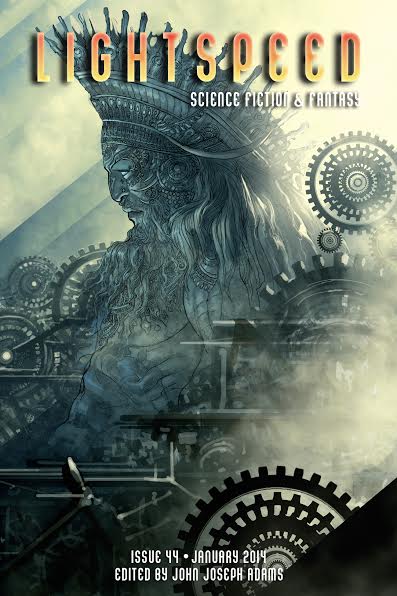Reviewed by Chuck Rothman
Lightspeed starts out the year with four new stories in their usual practice – two science fiction, two fantasy.
“In the Dying Light, We Saw a Shape” is about the discovery of “space whales”: giant creatures that fall to Earth. Thom and Lillian meet at the site where one of them landed, both trying to puzzle out what they are and what they mean. They become lovers, but their paths diverge as they reach different conclusions that set up some serious betrayals. Jeremiah Tolbert concentrates on the human interactions and a fine sense of wonder.
Anaea Lay contributes “Salamander Patterns,” the story of Sharon, who has chosen to take an alien symbiote — a “salamander” — that attaches to her to observe humans. It leads to some tension with her family and friends, partly because those who act as hosts are usually psychopaths. Sharon has to live with the situation and come to terms with her feelings as well as how to live with the salamander. The story is well written, but the emotions are too pale and diffused to make it particularly memorable.
“His Elbow, Unkissed” is part of a series of stories by Matthew Hughes under the umbrella of “The Kaslo Chronicles,” set in a universe where magic is replacing science. In this installment, Erm Kaslo is a private detective type who is trying to puzzle out how to use the devices of a thaumaturge that fell into his hands after his previous case. He joins forces with another thaumaturge, Diomedo Obron, as the two men discover they have mutual interests. This is a very good concept and Kaslo is a nice variation on the pulp hero, but the story is more like a chapter of a novel than a self-contained story, so it does deliberately leave you hanging.
Adam-Troy Castro has one of the strangest imaginations in the genre, coming up with ideas that are unlike anyone else. “The Thing About Shapes to Come” shows this, telling the story of Monica’s new baby who is born in the shape of a featureless cube. It’s not considered particularly weird, either, since most babies are now being born in geometrical shapes — spheres, cubes, cylinders, and the like. Monica’s parents aren’t sure how to react, but, to Monica, the cube – which she names Di – is her baby and she’s going to raise it. The story takes the bizarre situation in stride and has an ending that can’t be explained, but works excellently as an emotion-laden metaphor that gives you a lot to think about.
